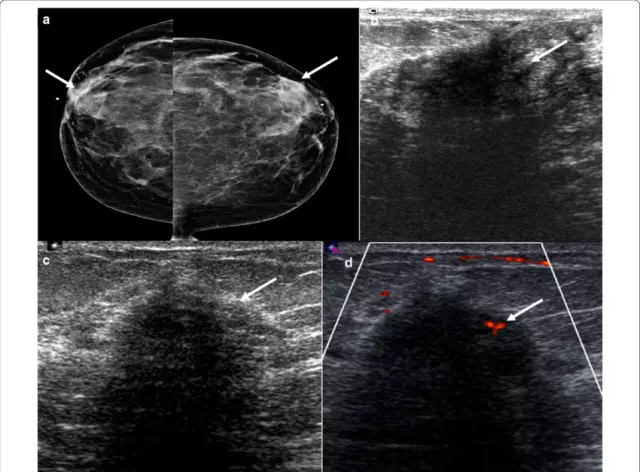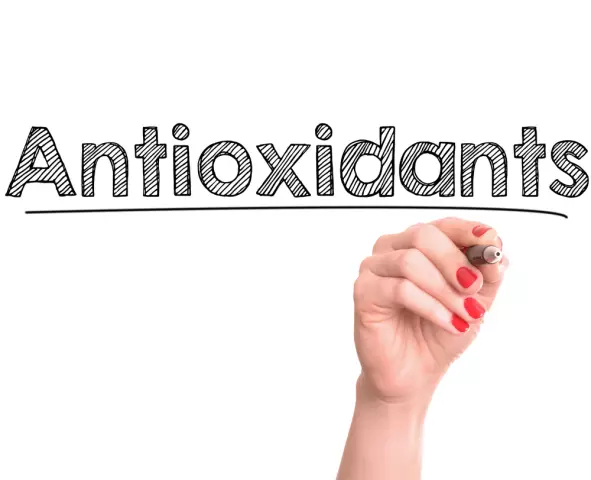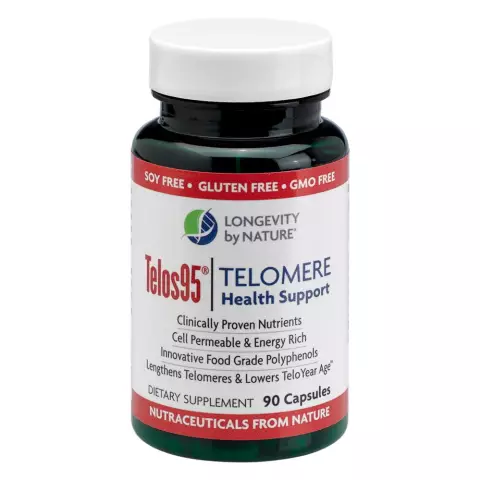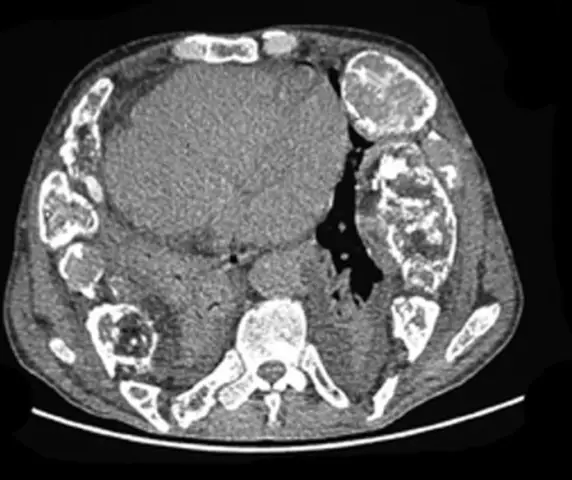- Author Rachel Wainwright [email protected].
- Public 2023-12-15 07:39.
- Last modified 2025-11-02 20:14.
Mastopathy: Antioxidants Guarding Women's Health
80% of women at least once in their life complained of discomfort in the chest, induration and engorgement. These are symptoms of mastopathy.

Mastopathy is characterized by a change in the ratio between the glandular and connective tissue of the mammary glands. This can lead to the formation of cysts (cystic breast disease), hardening of the gland (fibrous breast disease), or a combination of these processes (fibrocystic breast disease).
This disease is most common in women of childbearing age - from 25 to 45 years old, but in recent years mastopathy has become very "younger" - more and more often this diagnosis is heard by very young girls.
With mastopathy, the breast can increase, cysts and nodules of various sizes and shapes with fuzzy contours are formed in the tissues of the mammary glands. The disease can go unnoticed for a long time, but over time it manifests itself with aching dull pain in the chest, a pulling sensation that intensifies before menstruation. In every tenth patient, axillary lymph nodes are enlarged. In advanced forms, pain is given to the shoulder, shoulder blade or arm. Then any touch on the chest causes pain.
Although fibrocystic breast disease is benign, in some cases it can be an intermediate stage in the formation of a malignant tumor. Therefore, you should not be frivolous about mastopathy and ignore the symptoms of this disease.
A woman can diagnose the disease herself. It is necessary to periodically probe the chest with your fingers. If there are lumps that look like a pea, cherry or plum, you should immediately see a doctor and have an ultrasound and mammogram. Timely diagnosis and competent prevention of mastopathy make it possible to prevent the disease or cure it in the early stages.
Why does mastopathy develop? Causes and provoking factors
Mastopathy occurs due to hormonal imbalance in the body (excess of estrogen and prolactin). Among the causes of mastopathy and disorders that provoke hormonal imbalance are:
- Chronic stress.
- Endocrine diseases.
- Bad habits (smoking, alcohol abuse).
- Inflammatory diseases of the pelvic organs, the condition of which is inextricably linked with the condition of the mammary glands.
- Heredity. The likelihood of mastopathy increases in women who have blood relatives suffering from breast pathologies.
Speaking about the causes of mastopathy, many researchers note the leading role of free radicals in the development of both cystic fibrous formations and breast cancer.
An increased amount of free radicals is formed as a result of many of the factors listed above: inflammation, smoking, unhealthy diet, hormonal disturbances, polluted air, inhalation of car exhaust, contact with chemicals and pesticides, exposure to electromagnetic radiation, etc.
Why are free radicals dangerous? Free radicals are overactive molecules. When faced with ordinary substances that make up the cells of internal organs (proteins, lipids, amino acids, etc.), free radicals destroy them, turning them into the same free radicals. And this process is growing like an avalanche. In the end, each cell gets a lot of damage, it cannot perform its usual functions and as a result, the work of the entire organ is disrupted. In particular, excess free radicals cause the degeneration of breast tissue into fibrous tissue.

Each person's body has its own system of protection against free radicals - it is called antioxidant. Antioxidants are compounds that interact with free radicals and neutralize them, turning them into inactive molecules. Thus, antioxidants protect cells from destruction. However, when exposed to unfavorable factors, the amount of free radicals can increase excessively, and the body is not able to cope with them on its own. And then you need to help him by taking antioxidants.
How to treat fibrocystic breast disease?
Which remedy for mastopathy will be prescribed depends on the type of mastopathy and many other factors. Each case requires an individual approach and treatment regimen. A woman can be prescribed a course of hormonal drugs, physiotherapy, vitamins, with mastopathy, sometimes surgery may be indicated.

Hormone therapy is not the optimal solution to the problem, since the side effects of long-term use of hormonal drugs for mastopathy can cause more serious problems than hormonal imbalance.
Non-steroidal anti-inflammatory drugs for mastopathy are often prescribed. They are used to relieve pain and to improve circulation to reduce localized breast edema.
Depending on the psychological state, sedatives for mastopathy may be recommended.
The Internet is also replete with tips on how to get rid of breast lumps using folk remedies for mastopathy. However, the effectiveness of folk remedies for mastopathy has not yet been proven by official medicine.
Many doctors recommend starting treatment with dietary adjustments. According to some reports, an increased risk of developing mastopathy is associated with the use of methylxanthines - caffeine, theophylline, theobromine (found in coffee, tea, cocoa, caffeine-containing drinks). It is recommended that you limit your intake of foods containing methylxanthines as much as possible. In addition, with mastopathy, it is recommended to eat foods rich in fiber, drink at least 1.5-2 liters of liquid, and completely eliminate alcohol.
Antioxidants for mastopathy
As mentioned above, mastopathy is associated with excess formation of free radicals in the body. Therefore, antioxidants are additionally included in the complex therapy of mastopathy. With mastopathy, they help neutralize the destructive effect of free radicals on breast cells.
The Synergin antioxidant complex contains 6 powerful natural antioxidants: vitamins C (ascorbic acid) and E (tocopherol), carotenoids lycopene and beta-carotene (provitamin A), rutin and coenzyme Q10 (ubiquinone).

All of these antioxidants work against aggressive free radicals by stopping the chain reaction of cell destruction. Also, antioxidants are able to break down damaged areas of molecules, replacing old elements with new ones. The most effective antioxidants in mastopathy manifest themselves when used together.
In addition, each of the components of "Synergin" performs certain functions in the female body.
The antioxidant tocopherol (vitamin E) in mastopathy helps to normalize hormonal balance, leveling the ratio between progesterone and estrogen. He takes part in the work of the immune system.
The carotenoid lycopene plays a special role in the prevention of mastopathy. It protects breast cells from free radical damage, reduces inflammation.
Another powerful antioxidant from the group of carotenoids is beta-carotene (provitamin A). Beta-carotene is a natural regulator of estrogen. It prevents the growth of epithelial tissue and stroma of the mammary gland and leads to a decrease in such manifestations of mastopathy as engorgement of the glands and soreness. Beta-carotene prevents blockage of the intercellular ducts of the mammary glands, thus eliminating the prerequisites for the development of cysts. Also, beta-carotene improves immunity, increases the body's resistance to stress, and reduces the risk of developing inflammatory diseases.

Rutin (or vitamin P) improves the condition of blood vessels, normalizes blood pressure and heart rate. Rutin also helps to improve microcirculation, preventing stagnation and reducing the risk of developing fibrocystic formations.
The unique lipophilic antioxidant coenzyme Q10 (ubiquinone) is required by cells for energy production. Coenzyme Q10 deficiency is associated with an increased risk of fibrocystic breast disease and other breast diseases. Also, Q10 strengthens the immune system, helps to slow down the aging process, and is effective in asthenic syndrome and chronic fatigue syndrome.
Vitamin C strengthens the immune system, inhibits the proliferation of breast tissue, and reduces the risk of developing malignant tumors.
"Synergin" acts on one of the reasons for the development of mastopathy - an excess of free radicals, thereby preventing its development. The prophylactic intake of Sinergin helps to improve microcirculation in the vessels of the mammary glands, strengthen immunity, reduce the risk of developing mastopathy and other changes caused by free radicals.
"Synergin" is combined with other drugs for mastopathy.
The dosage of the drug is 2 capsules per day for one month.
In addition, do not forget that the prevention of mastopathy - primarily depends on the woman herself. Try to exclude factors that provoke the development of mastopathy. Talk to your mother, aunts, grandmother and other relatives, find out if they had symptoms of mastopathy in order to determine a genetic predisposition to this disease. Residents of cities should take into account that car exhaust, sources of electromagnetic radiation, polluted air cause an increased formation of free radicals and increase the risk of mastopathy, therefore, taking antioxidants in this case is included in the mandatory preventive measures. Try to conduct a self-examination of the mammary glands at least once every six months in order to identify seals and other signs of mastopathy in time.

Found a mistake in the text? Select it and press Ctrl + Enter.






